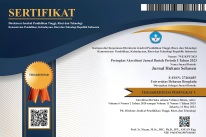IMPLIKASI POSITIVISME TERHADAP ILMU DAN PENEGAKAN HUKUM
Abstract
Law as enacted, established, must always be separated from the law that should be created, which is desirable. This is what we now often accept as giving meaning as positivism. The research method used in this research is to use normative legal research method. The principle of positivism flow is the law is considered as a logical, fixed, and closed system (closed logical system). The law is strictly separated from morals, so from matters relating to justice, and not based on good judgment or judgment. the legal worldview is seen from a mere legal telescope and then resolving the cases that occur. The application of positivism to jurisprudence in Indonesia has its own implications that are more negative than positive, because the science of law in Indonesia is more dominated by positivism with its very legal thinking positivitik, the implication that the development of jurisprudence in Indonesia to be not as true science (genuine science), even fall in the practical science, which works by working on normative texts called positive law.Implikasi positivisme to law enforcement that gave birth to law enforcement only stop at procedures, regulations and administrative so that law enforcement in Indonesia becomes detached by the needs of its people and no longer as a search for justice.
Keywords: positivism and justice






